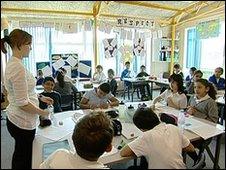Why heads are breaking the rules on Sats
- Published
This is the year that those who are used to setting the rules decided to break them.
Those pillars of the community, the head teachers of England's primary schools, are rebelling against their own head - the government.
The national schools tests in English and maths - known as Sats - are a cornerstone of England's primary education system.
But this year children in hundreds, if not thousands, of schools will not take them.
The raw results from these tests are used to make the primary school league tables, which are pored over by many parents and provide the bedrock on which schools are judged by Ofsted inspectors.
Heads and deputies who voted for this boycott say the tests encourage teachers to follow a narrow curriculum, focusing on reading and writing, and exam technique at the expense of other subjects.
But most of all, they want to take a sledgehammer to the league tables.
These are drawn up by media organisations from the raw data released by the government.

Some schools are getting children to sit last year's tests
Humiliate
The heads say the tables humiliate schools and children and are not a true reflection of what either does.
They think there should be national or area-by-area results instead.
But the authorities see the tests as a key way of holding schools to account.
Labour's Schools Secretary Ed Balls talked of the "legal and moral duty" heads have to stage the tests and his "deep disappointment" that they were to go ahead with the boycott.
He said the tests had helped drive up primary school standards and were a vital indicator to parents of how their children and their local schools were performing.
But talk of the government or councils taking legal sanctions against the heads did not turn into action.
With the tests falling days after the most closely-fought general election for a generation, that is perhaps not surprising.
Classroom rebellion
It will be down to the new administration to deal with this classroom rebellion.
And all three main parties are against the boycott.
In the run up to the election, both the Conservatives and the Liberal Democrats said they would reform the tests - but no-one was talking about scrapping the league tables - a key aim of the joint NAHT and NUT campaign.
The unions say they are not against testing per se and suggest an alternative system where children are assessed by their teachers - with the results being checked externally.
The NUT says there should be "sampling" of results across the country to give a picture of how children are doing nationally.
Teachers in England already make formal assessments of their pupils, using the same scale as that used in the national tests.
These ratings are submitted to the government and for the first time this year they will be published alongside the Sats results.
The change came about after talks with the head teachers aimed at averting this industrial action.
But it did not go far enough for the heads, who look at Wales and Northern Ireland, where Sats were abolished, and to Scotland which has never had them.
The unions say they have been encouraged by the political parties' talk of reform - but only time will tell whether this will translate into a solution both sides can live with.